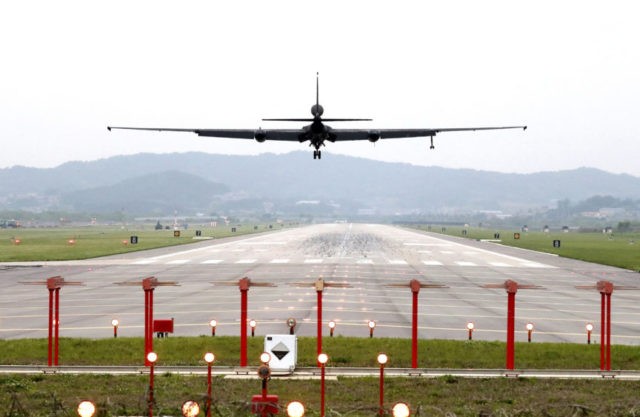English translations of the North Korean editorials that implied dictator Kim Jong-un might withdraw from his June summit with President Donald Trump reveal North Korea was infuriated by long-scheduled U.S.-South Korean military drills.
The North Koreans denounced these exercises as a “deliberate military provocation” and rejected criticism of North Korea’s human rights violations as a “senseless act of disregarding elementary etiquette.”
The drill in question is an annual air combat exercise called Max Thunder. This year’s exercise began on May 14 with very little fanfare; in fact, the Pentagon did not even issue a formal press statement that Max Thunder was underway.
North Korea’s state-run KCNA news service described the U.S.-South Korea drills as a “deliberate military provocation” and a threat to the diplomatic spirit of Kim Jong-un’s April summit meeting with South Korean President Moon Jae-in in the border village of Panmunjom. Note that throughout this tirade, the North Koreans refuse to capitalize the “S” in South Korea, treating it as a geographic region instead of a legitimate nation-state:
The south Korean authorities, together with the U.S., has been staging the largest-ever “2018 Max Thunder” joint air drill throughout south Korea since May 11 in a bid to make a preemptive air strike at the DPRK and win the air.
Involved in the drill are over 100 fighters of various missions including B-52 strategic nuclear bombers and F-22 Raptor stealth fighters under the supervision of the U.S. imperialist aggressor forces in south Korea and the south Korean air force. It is to last till May 25.
Public opinions at home and abroad comment that the maneuver is the largest-ever and a reflection of the invariable stand of the U.S. and south Korea to persist in the “maximum pressure and sanctions” against the DPRK.
The DPRK-targeted drill across south Korea is an undisguised challenge to the Panmunjom Declaration and a deliberate military provocation to the trend of the favorably developing situation on the Korean Peninsula.
KCNA fumed that Max Thunder is a “rude and wicked provocation,” lashing out at South Korean officials for allowing a “madcap north-targeted war and confrontation racket” to create a “seriously awful situation” on the peninsula.
“The south Korean authorities, in particular, resorted to such improper acts quite contrary to the promise to make efforts for the peace, prosperity and reunification on the peninsula together with the north and are allowing even human scum to brazenly hurl mud at the dignity of the supreme leadership of the DPRK and its system and play down the Panmunjom Declaration in front of the building of the ‘National Assembly,’” the North Korean editorialists said.
This was presumably a reference to demonstrations held at the National Assembly in Seoul by conservative South Koreans who deeply distrust the Kim regime and its patrons in China, and oppose making any concessions to the North.
Another KCNA editorial railed against the U.S. State Department for “hurling mud” at North Korea over its violently repressive government and “human rights abuses,” a term the North Koreans put in scare quotes throughout the article.
The State Department has indeed criticized North Korea as “one of the most repressive and abusive governments in the world” and promised to “press for accountability for those responsible” during negotiations with Pyongyang.
Noting that South Korea’s Unification Ministry has also discussed promoting free speech and human rights in the North, KCNA called such talk “an unpardonable challenge and blatant infringement upon the dignity and sovereignty of the DPRK.”
This editorial hammers the same point that an unscrupulous “racket” seeks to undermine peace talks by insulting the Kim regime:
The U.S. gets hell-bent on putting pressure on the DPRK, raising the non-existent “human rights issue” ahead of the DPRK-U.S. dialogue.
This is a senseless act of disregarding elementary etiquette towards the dialogue partner.
For the U.S. to cling to the provocative anti-DPRK “human rights” racket is little short of turning the trend of dialogue and peace back to the phase of confrontation and tension and, this may spoil the last hard-won opportunity of solving the issue.
After North Korea complained, the Pentagon disputed Pyongyang’s claims that this year’s exercise was the “largest ever,” and defended the program as “integral to our ability to safeguard the Korean Peninsula” in partnership with South Korean forces.
South Korea’s Defense Ministry said on Wednesday that Max Thunder drills will “proceed as planned” with the mutual support of the American and South Korean governments.
“The exercise is designed to enhance the capability of pilots and is not an implementation of an operational plan or an attack maneuver,” the ministry insisted.
The Straits Times suggested one possible concession to North Korea’s objections on Wednesday: American B-52 bombers may be withdrawn from the exercise. The Pentagon swiftly denied this report, stating “the scope of Max Thunder has not changed.”
North Korea has traditionally voiced its loudest complaints against long-range bombers participating in air combat exercises with South Korea or flying patrols near the Korean Peninsula.
Yonhap News reported on Wednesday that South Korean Defense Minister Song Young-moo held an emergency meeting with Gen. Vincent Brooks, commander of U.S. Forces Korea, to discuss Pyongyang’s decision to cancel inter-Korea talks and threats to withdraw from the summit with Trump.
North Korea has persistently complained that every U.S.-South Korean military drill is a dress rehearsal for an invasion, or perhaps even an invasion disguised as a military drill. However, Kim told a South Korean delegation in March that he understood the 2018 exercises would proceed as planned. The U.S. state department also stressed that North Korea knew Max Thunder was still on the calendar.

COMMENTS
Please let us know if you're having issues with commenting.